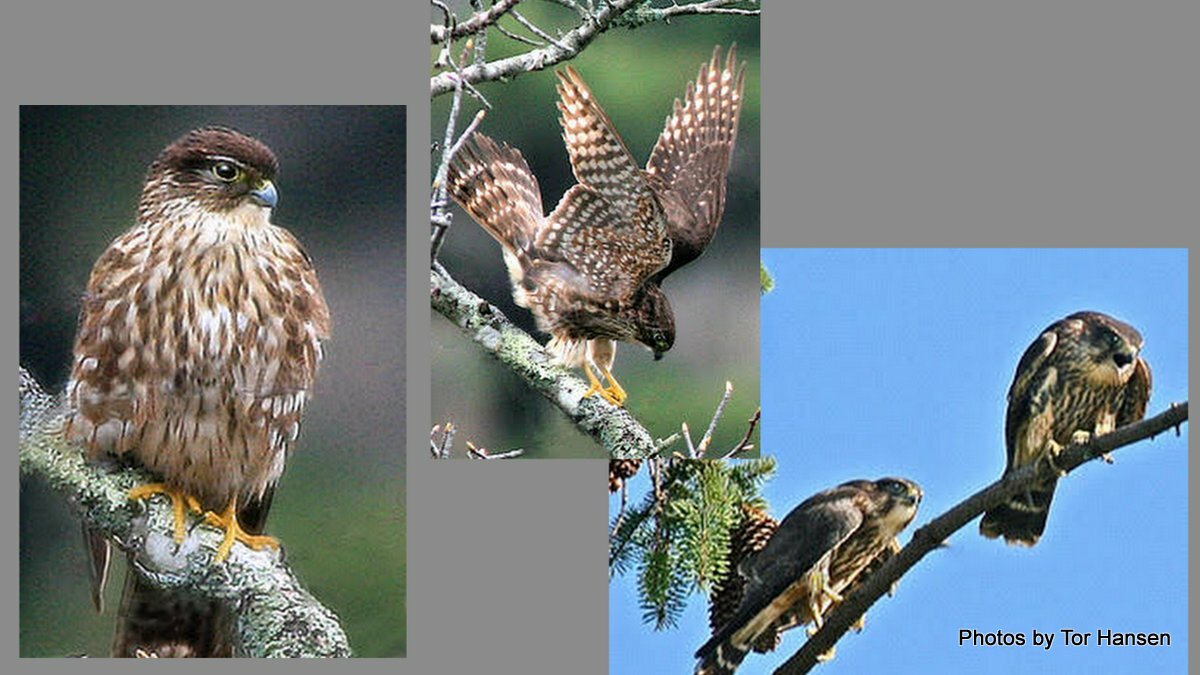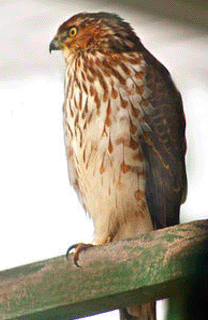Berkshire Wild: A Cooper Has LandedBy Tor Hansen, iBerkshires columnist
06:01PM / Saturday, May 06, 2023 | |
 Merlins at Spruces Park in Williamstown. The mother merlin is giving her offspring hunting and flying lessons. Merlins at Spruces Park in Williamstown. The mother merlin is giving her offspring hunting and flying lessons. |

A Cooper's hawk roosting at my porch feeder will hunt smaller birds and rodents and thrives in urban areas.
Oh my! Much to my astonishment, only 8 feet away from me, seated at my iMac desktop, a bird so bold and intrepid has alighted inside my porch bird feeder station where for years now, I enjoy small but certain revelations from watching winter birds come and go in search of bird seeds and suet.
Of course that includes various woodpeckers as well as the prevalent throng that feed in a wave of succession the chickadees, tufted titmice, and the acrobatic nuthatches. Rarely do bluejays appear with their shrill alert calls, and sometimes rosy cardinals somewhat shy that remain briefly sorting sunflowers.
This stately accipiter, a Cooper's hawk, is an infrequent visitor to my avian diner complete with railings where seeds large and small are laid out for any and all local birds braving the cool of winter. The syrupy call of the boisterous winter wren on occasion tips a little revelation, declaring its undeniable niche in the Berkshire woodland habitats, even when new snow is falling.
Suet cakes, rendered beef or meat fats infused with berries, nuts, and peanut butterfly, attract first the downy, then the all but identical but larger black and white hairy species, that announce their insistence with a loud chirp, can be followed by the handsome highly decorated red-bellied woodpecker, an avian songster telling its presence with a gurgling run of a musical scale. Its back contour feathers are finely layered with black and white ladders and a ruby-red scarf adorns its nape, the back of its neck.
All of these birds are potential prey for the hooked talons of the speedster Cooper's hawk, so reminiscent of the peregrine falcon, the fastest hunter in the sky. I could not help feeling affection for this resourceful hunter as it roosted still for 20 minutes, searching the immediate for winged prey; I felt a kinship with falconers, who no doubt become entranced with their beauty, prowess, and obvious mutual affinity.
A light icy snow had fallen overnight, and the Hoosac Range wears a mantle of snow. Adhered to a vertical column supporting the upper porch, a dazzling multicolored pin wheel spins incessantly shooting the breeze, installed here to tell the wind's velocity. Incoming hunger-driven birds may be startled at first by its whirligig flashing, but soon overcome its alarming wherewithal, and feed deliberately once again.
When a squadron of rock doves flew in, they roosted momentarily, gaped at the loathed intruder, and departed in a flash. My picture window is decorated with assorted window art to prevent collisions with clear glass — stained glass, pendants on chains, and crystalline prisms to beam out the awesome colors when they separate white light into respective colors of the visible light spectrum.
I sensed certain curiosity emanating from the Cooper, and wished my camera be quick enough to capture the magical wings when the hawk departed.
Unprepaired to take a quick picture, I resolve to go into extreme slow motion, not leaving my chair, and stretch as far ... beyond an arm's reach ... somehow able to grasp the Canon Eos Rebel Xsi and Canon 75-300 zoom lens ... and get into position without frightening away El Cooper. Ah, stealth again proves the victor.
I take multiple shots as the bird remains alert and peering about. Later once recorded into this iMac desktop and sent email to brother Erik in Maynard, his results at retouch and enhancement prove admirable ... and so this closeup rendezvous glows with adoration.
The Cooper is magnificent, with its audacious predatory instincts and fine-tuned razor sharp talons, the displacement of a neighboring smaller raptor sparrow hawk or kestrel (Falco sparverius), can be traced to the over-rule of the more domineering aggressor. The Cooper is larger and more aggressive; the kestrel prefers more open meadows and sylvan edges and not so much urban settings. Considered the most opulently colorful in plumage of all our New England raptors, this solitary falcon hovers above its prey and drops down on insects and small mammals. Hence its other name "Windhover."
Farmers encourage them by erecting bird boxes about the barnyards specifically designed to accommodate a nesting female incubating 4-5 blotched eggs with scanty nesting materials. I purchased such a suitable nesting box at Bird Watches Store in Orleans, Cape Cod, and installed it 15 feet up on a telephone pole near our house where the resident hen was obvious due to her long tail feathers protruding from the entrance hole.
We watched windhover for minutes on end, dipping and rising on a breeze off the bay, waiting to pounce on a mouse or vole scurrying in dune grass below. As spring advances, the server-growing elm tree towering above this old brick and stone schoolhouse is often a roosting place for this restless Cooper.
Merlins have long inhabited the Berkshires, and their appearance in the tall spruces at Spruces Park in Williamstown, the former trailer park gone to benign weedy neglect, indicates an ideal setting for these falcons (Falco columbarius) to nest, rear their young birds, and utilize an abundance of insects, including grasshoppers, caterpillars, crickets, and small rodents. Their presence here maybe relatively new since the Tropical Storm Irene devastated the trailer park.
One can follow the female merlins training their fledglings to master the skills of flight, persistently calling them to fly from spruce to spruce, and to attack and snatch their prey, thus sustaining their important place in this ecosystem. The Spruces Park today is engaged in preserving as much of the wilderness inherent there, supporting habitat for pollinating bees and butterflies as well, in combination with providing human recreational needs, including picnicking tables as well as open space and pathways for doggy exorcise.
I hope there will be ample space for all resident raptors to co-exist and not be faced with only yielding to top predatory displacement. All the spruce trees belong uncut so that merlins and maybe a Cooper will utilize this unique habitat where mamma hawk will direct her fledglings in the arts of flying and hunting.
As spring advances, just beyond this window, the ever-growing elm tree towering above this old brick and stone schoolhouse is occasionally a roosting place for this avid hunter, where smaller finches gather to feed on opening buds. They dart away in haste as the Cooper so fleet of feather dashes in chase.
Tor Hansen is a naturalist writer, photographer, and musician. His column Berkshire Wild looks at especially butterflies, birds and other small creatures at home in the Berkshires and Massachusetts. He does talks and presentations and can be contacted at torhansen46@gmail.com.
|

